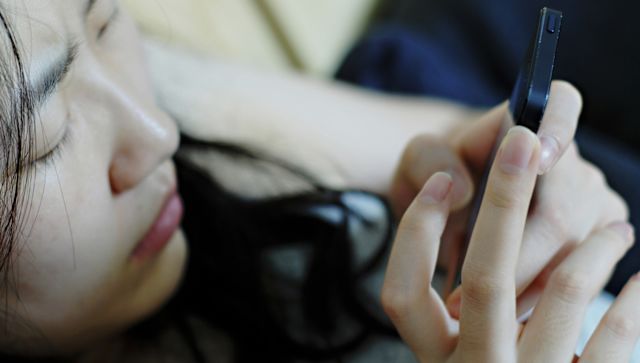Updated on January 8, 2025.
These days it’s increasingly rare to see anyone without a phone. The rise in social media has increased screen time significantly, particularly among teenagers. As much as 95 percent of teens using some form of social media, including YouTube, TikTok, Snapchat, and Instagram. There are many potential pitfalls of excessive screentime but one especially harmful consequence for young people is disrupted sleep.
How much sleep to teens need?
Teens between the ages of 13 and 18 should get between eight and 10 hours of sleep each night. But more than just getting sufficient hours, they need good-quality sleep. That means in addition to it lasting eight to 10 hours, it should be continuous (without much waking in the night) and deep. Sleep is essential for teens’ health, and poor sleep is linked to being at higher risk for emotional health problems and even suicide.
How smartphones are affecting kids' sleep
A 2023 systematic literature review published in Nursing Reports explored the research so far on teenagers, smartphones, and sleep, contained in six studies. The researchers found that as soon as kids own a smartphone, the amount of sleep they’re getting starts to go below the recommended amounts. And one study found that 97 percent of teens were using tech or screens in the hour before they fell asleep, with 74 percent using a smartphone.
The studies they examined showed that using smartphones in bed to watch videos, call, and text also had a direct effect on the amount of sleep teens get, and whether falling asleep was difficult. Teens who texted at night were likely to fall asleep much later, sleep less, and sleep at irregular times of the day.
And the studies pointed to a correlation between teens’ well-being and smartphone use at nighttime. Kids who used phones at night were more likely to feel depressed, have less ability to cope with day-to-day problems, and have low self-esteem.
Social media is taking a health toll
More than a third of teens aged 13 to 17 say they’re using social media “almost constantly,” a 2023 report from the U.S. Surgeon General Vivek Murthy, MD revealed. And almost one-third of teens say they use screen media until at least midnight on weekdays. Given that social media apps are the most popular apps used by teens, the likelihood is that most of that screen time is on social media, and probably on their smartphone.
Social media usage has also been linked to poor mental health outcomes. Altogether, the situation is considered so dire that in June 2024, Dr. Murthy called for a warning label to be placed on social media platforms, a move that will need the approval of Congress.
Social media use can disrupt sleep and lower the quality of sleep kids get. A 2021 systematic review of 42 studies, published in Sleep Medicine Reviews, found that excessive use of social media was linked to poor sleep quality. It’s also linked to kids getting less sleep and having trouble falling asleep, or other issues with sleeping.
How to manage late-night smartphone use
To help teens navigate their smartphone usage and get vital, high-quality sleep, parents and guardians can set some healthy boundaries.
Phone-free sleep time
It’s best to have a rule of no devices in the bedroom after a certain time of day, or at least for an hour before sleep time. You might also think about having other times of the day be phone-free as well, like family mealtimes. One study found that when teens spend actual time interacting with their family and friends (as opposed to online time), they fall asleep faster.
Open communication
It’s also helpful to make sure you take time to talk with your teenager about their social media experiences. Make them feel welcome and safe to talk with you about it, and they may be less inclined to hide their usage from you.
Educate yourself and your kids
Have conversations about both the good and bad sides of social media platforms. Make sure they understand how to keep their information private and about how their feeds will change and focus on certain topics according to algorithms.
Practice what you preach
It’s important to model good behavior for your teen. If you ask them not to use their phone for an hour before bedtime, then you shouldn’t either. If you find that refraining from using your phone is hard to do, that could be something you bond with your teen about. Talk with them about how you understand how hard it can be to put down your devices. Support each other, being gracious with mistakes and cheering each other on.







